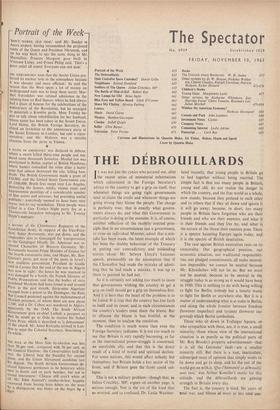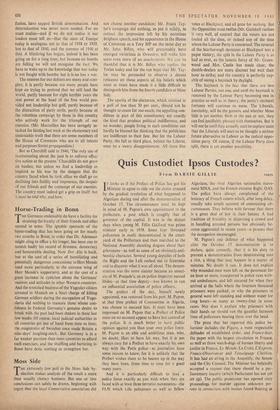THE DEBROUILLARDS
was not just the cynics who pointed out, after I the recent series of ministerial exhortations which culminated in the Foreign Secretary's advice to the country to get a grip on itself, that whenever things are going right governments tend to claim the credit and whenever things are going wrong they blame the people. The charge is perfectly true; that is exactly what govern- ments always do, and what this Government in particular is doing at the moment. It is, of course, another reflection of the recently erected prin- ciple that in no circumstances can a government, or even an individual Minister, admit that a mis- take has been made, the latest example of which has been the shabby behaviour of the Treasury in putting out contradictory and misleading stories about Mr. Selwyn Lloyd's Leicester speech, presumably on the assumption that if the, Chancellor had made the mistake of admit- ting that he had made a mistake, it was up to them to pretend he had not.
So it is certainly not asking too much to insist that governments wishing the country to get a grip on itself should get a grip on themselves first. And it is here that the heart of the problem is to be found. It is true that the country has lost faith in itself and its cause; and in such circumstances the country's leaders must share the blame. But to allocate the blame is less fruitful, at the moment, than to analyse the condition.
The condition is much worse than even the Foreign Secretary indicates. It is not too much to say that Britain is very rapidly becoming, as far as the international power-struggle is concerned, an unreliable ally, and that this is the direct result of a kind of moral and spiritual decline. For some nations, this would affect nobody but themselves; but Britain holds a key sector of the front, and if Britain goes the front could col- lapse.
This is not a military problem—though that, as Julian Critchley, MP, argues on another page, is serious enough. Nor is the rot of the kind that so worried, and so confused, Dr. Leslie Weather- head recently, that young people in Britain go to bed together without being married. The simple fact is that too many people in Britain, young and old, do not realise the danger in which the country, and the free world as a whole, now stands; because they pretend to each other and to others that if they sit down and ignore it it will go away; because, in short, too many people in Britain have forgotten who are their friends and who are their enemies, and what it is their friends and they live by, and what is the nature of the threat their enemies pose. There is a spectre haunting Europe again today, and it is the spectre of British neutralism.
The case against British neutralism rests on its immorality. Our geographical position, our economic situation, our traditional responsibili- ties, our pledged commitments, all make neutral- ism impossible; we cannot be neutral because Mr. Khrushchev will not let us. But we must not be neutral, because to be neutral in the struggle today is as wrong as it would have been in 1940. This is nothing to do with being willing to fight for Berlin; nobody but a lunatic wants to fight for Berlih or anywhere else. But it is a matter of understanding what is at stake in Berlin, and along the whole frontier between freedom (however imperfect) and tyranny (however im- proved) which Berlin symbolises.
Those who sit down in Trafalgar Square, or who sympathise with them, are, it is true, a small minority; those whose view of the international situation is as puerile as the political parts of Mr. Roy Brooks's property advertisements—that it is all the Germans' fault—are a smaller minority still. But there is a vast, inarticulate, submerged mass of opinion that simply wants to lie down and go to sleep, and let the rest of the world get on with it. 'Aire l'humanite se debrouille sans inoi,' was Arthur Koestler's motto for this attitude, and the debrouillards are gaining strength in Britain every day.
The fact is, the country is tired. Six years of total war, and fifteen of more or less total con- fusion, have sapped British determination. And determination was never more needed. For we must realise—and if we do not realise it our leaders must tell us—that the state of Europe today is analogous not to that of 1938 or 1939, but to that of 1940, and the summer of 1940 at that. A blitzkrieg has begun, indeed it has been going on for a long time; but because no bombs are falling we will not recognise the fact. We have to wake up to the knowledge that war today is not fought with bombs; but it is no less a war.
The reasons for our defeats are many and com- plex; it is partly because too many people have kept on trying to pretend that we still lead the world, partly because for eight terrible years the real power at the head of the free world pro- vided not leadership but golf, partly because of the distraction of party strife, partly because of the relentless campaign by those in this country who actively work for the triumph of our enemies. (Mr. Macmillan has been savagely at- tacked for hinting last week at the elementary and undeniable truth that there are some members of the House of Commons who are to all intents and purposes Soviet propagandists.) But as Churchill said in 1940, `The only use of recriminating about the past is to enforce effec- tive action at the present.' Churchills do not grow on bushes; but unless we find a leadership as inspired as his was by the dangers that the country faced when he took office we shall go on declining into futility and impotence, the despair of our friends and the contempt of our enemies. The country must indeed get a grip on itself; but it must be told why, and how.











































 Previous page
Previous page